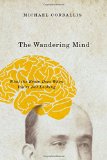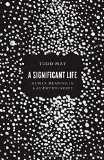new book – ‘The Wandering Mind: What the Brain Does When You’re Not Looking’ by Michael Corballis
April 15, 2015
The Wandering Mind: What the Brain Does When You’re Not Looking by Michael Corballis (University of Chicago Press, 2015)
(kindle ed.), (amazon.co.uk), (UK kindle ed.)
Book description from the publisher:
If we’ve done our job well—and, let’s be honest, if we’re lucky—you’ll read to the end of this description. Most likely, however, you won’t. Somewhere in the middle of the next paragraph, your mind will wander off. Minds wander. That’s just how it is.
That may be bad news for me, but is it bad news for people in general? Does the fact that as much as fifty percent of our waking hours find us failing to focus on the task at hand represent a problem? Michael Corballis doesn’t think so, and with The Wandering Mind, he shows us why, rehabilitating woolgathering and revealing its incredibly useful effects. Drawing on the latest research from cognitive science and evolutionary biology, Corballis shows us how mind-wandering not only frees us from moment-to-moment drudgery, but also from the limitations of our immediate selves. Mind-wandering strengthens our imagination, fueling the flights of invention, storytelling, and empathy that underlie our shared humanity; furthermore, he explains, our tendency to wander back and forth through the timeline of our lives is fundamental to our very sense of ourselves as coherent, continuing personalities.
Full of unusual examples and surprising discoveries, The Wandering Mind mounts a vigorous defense of inattention—even as it never fails to hold the reader’s.
Google Books preview:







